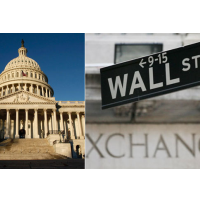Are Wall Street and Big Business Running the Show in the New Congress?
 (AP photos)
(AP photos)
The 114th Congress is only a couple of weeks old, and already powerful financial and corporate interests are having their way, particularly in the House.
Legislation backed by Wall Street interests has targeted the Dodd-Frank (pdf) reform law, which imposed a series of restrictions on banks and investment firms.
One of the bills passed by the House, almost entirely with Republican votes, will make it harder for financial regulators to do their jobs, including “stricter cost-benefit analyses and an expansion of judicial review,” The New York Times reported.
Another House bill that was just passed, “The Promoting Job Creation and Reducing Small Business Burdens Act,” would, among other things, allow “more than half of public companies” to avoid reporting their financial statements as open data to the Securities and Exchange Commission, according to the Sunlight Foundation.
Former Representative Barney Frank (D-Massachusetts), who coauthored Dodd-Frank, has complained that President Barack Obama has not been willing to stand up to Wall Street’s efforts to erode the law. In fact, his signing this week of a reauthorization of the Terrorism Risk Insurance Act (pdf) (TRIA) had the effect of doing away with a number of financial industry regulations, given that TRIA includes a provision designed to chip away at Dodd-Frank. Senator Elizabeth Warren (D-Massachusetts) and other Democrats strongly opposed that provision.
“The president was slow in drawing the same kind of line on financial reform that he did on health care,” Frank told the Times.
Wall Street lobbying has been fierce, with $74 million spent by the securities and investment industry during the first three quarters of 2014, reported the Center for Responsive Politics. Combined with last year’s campaign contributions from various financial interests, that total amounted to a $1.2 billion war chest for undermining Wall Street reform, according to Americans for Financial Reform.
“In American politics, when a particularly economically motivated group gets behind something, that can be more powerful than an ideological viewpoint,” Frank continued. “Nobody who makes their money in health care is going after [the Affordable Care Act]. There are a lot of people making money in finance that are going after this [Dodd-Frank law].”
-Danny Biederman, Noel Brinkerhoff
To Learn More:
In New Congress, Wall St. Pushes to Undermine Dodd-Frank Reform (by Jonathan Weisman and Eric Lipton, New York Times)
House Passes Legislation to Ease Some Dodd-Frank Financial Rules (by Jonathan Weisman, New York Times)
Obama Signs TRIA despite Dodd-Frank Provision (by Kevin Cirilli, The Hill)
The House Just Voted to Restrict Open Data at the SEC — What's Next? (by Matthew Rumsey, Sunlight Foundation)
House Passes Bill To Make Everything Harder And Worse (by Ari Phillips, Climate Progress)
Big Bank Lobbyists Help Write Bank Regulation Bills for Congress (by Matt Bewig, AllGov)
- Top Stories
- Unusual News
- Where is the Money Going?
- Controversies
- U.S. and the World
- Appointments and Resignations
- Latest News
- Trump Orders ICE and Border Patrol to Kill More Protestors
- Trump Renames National Football League National Trump League
- Trump to Stop Deportations If…
- Trump Denounces World Series
- What If China Invaded the United States?






Comments